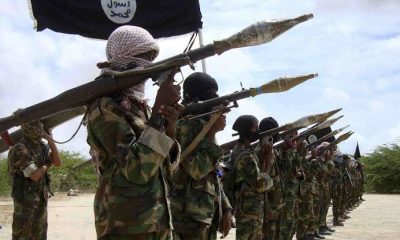Opinion
Let’s talk hope, by Hassan Gimba
Let your hopes, not your hurts, shape your future, someone once said. Even though there are enough reasons to continue with the treatise on banditry and shared sovereignty – such a depressing fact of our national life – however, today I want to look at the other side – the side of hope. Hope is to believe with an audacity that better days are afoot, the ability to see light at the end of the tunnel.
Yeah, hope is tough at the moment – what with the massacre of about 30 of our gallant soldiers by Boko Haram in Minna over a tussle of who holds sovereignty – Nigeria or them – over a mining site located at Ajata Aboki village, via Erena Ward of Shiroro Local Government Area of Niger State. Among those killed were a major and a captain.
Still, let’s talk hope – even though the bandits are said to have issued quit notices to residents of villages in five local government areas of Plateau State, namely Sabon Zama, Gindin Dutse, Anguwan Tsohon Soja, Anguwan Yuhana and Anguwan Mangu, all in Wase Local Government Area of the state.
Residents said masked gunmen descended on the communities last week and asked them to either leave within five days or risk “war”. They are “dragging” sovereignty over the area. Many of the residents have since trooped out, becoming IDPs in their fatherland.
Still, let’s talk hope. Not because CSP Haruna Abdulmalik, the kidnapped Divisional Police Officer in charge of Nasarawa Eggon Local Government of Nasarawa, was released by his abductors after spending four days in their den. Even though the outlaws were said to have demanded N5 million, the issue is that they have released him.
Though about the period the CSP was keeping the copnappers company, another DPO, this time of Birnin Gwari, Kaduna State, was also copnapped from the highway on his way to report for duty, let’s talk hope.
Yes, let’s talk hope – even though abductors nonchalantly move about in the bushes with their human cargo, demanding all sorts of ransom – money, motorcycles, cigarettes, food items, etc., and imposing taxes on communities.
Another wing of Boko Haram, claiming to be bandits, Igbo separatists, and various other tribal irredentists and non-state actors are having a field day in Nigeria, doing what they want when they want and however they want. Even though our security agencies seem overwhelmed, looking like ineffective, castrated bulls and the hapless citizenry looks on askance and in fear and chagrin, by all means, let’s talk hope.
Even with them taking over towns, villages and hamlets, extorting various taxes from the people, seizing their wives, forcefully carrying off unlucky daughters and enslaving our youth, let’s remember Fela Anikulapo Kuti’s song and smile in our suffering, and talk hope.
I have realised that when you live in the present alone, you may not see hope, not to talk of discussing it. To avoid being fixated on our problems, we must look at where we are coming from and then dare to look at the future with hope. It’s only this way that one can confidently look anyone in the eye and say, “Hey, let’s talk hope.”
Growing up in Maiduguri in the 1970s is one of my cherished memories. At that time, Maiduguri was a dusty, sunny, airy and peaceful town to live in. Muslims and Christians, people of all tribes, lived as brothers, looking out for one another. We had no pronounced divisions or extremes as today. I always say Nigeria cannot hold FESTAC today. Some rabble-rousing Muslim and Christian clerics will attempt to bring down heaven by mischievously claiming that the symbol of the festival has turned Nigeria into an idol-worshipping country.
It was a common sight in the 70s to see grown-up people moving about without shoes. And there was no shame attached to it. The hot tropical sun had a glaring fire to it that heated the sandy soil of the encroaching Sahara desert. Mirages, because of the shimmering rays from the middle of the burning sun, were common sights on the dusty roads of Maiduguri and the tarred roads of the Government Reserve Area, GRA.
Now, some forty years down the line, almost everywhere in the beautiful town of Maiduguri has tarred roads. Back then, you saw such roads in front of the Shehu’s palace and the GRA. Even the GRA did not have all its roads covered by asphalt. The primary school I went to, Shehu Garbai, adjacent to the commissioner of police’s house, did not have a tarred road passing in front of it, unlike now.
And so, many people then had semi-baked feet with cracked furrows that could hide razor blades. Those who could manage it had slippers cut out of articulated vehicles’ tyres. Some school children could boast of shoes. The Cortina brand was the trend. However, they were kept under the bed until it was time for school.
Heat makes some human “companions” comfortable. Flies, mosquitoes, lizards, etc., love the heat. In Maiduguri, perhaps until recently, it was a common sight to see mosquitoes form blankets in the afternoons just above our heads, out of our reach, waiting for sunlight to fade to descend on us.
Before Maiduguri, I was in Gembu, a temperate town on the Mambila Plateau, in the ’60s. Sitting at an elevation of about 2,300 meters above sea level, the heat of the scorching sun is not one of the problems of its people. This is a fertile land, where mosquitoes are unheard of and where one can grow the crops farmers normally grow in Europe. The gentle and friendly people of this town had the problem of jiggers because many of them, too, went about with no shoes.
Those were periods when almost everyone had a patch, called pachi in Hausa, on clothes. Trousers, shorts for kids, skirts for girls, wrappers, shirts, jumpers – name them, most had patches, some multiple. There was no shame because it was normal. There were even people who moved about naked or half-clad. Unlike today, the most fashion-conscious could be seen with a black tetralin trouser, blue jumper and white Babbar Riga (gown). Now, people who want that combination can easily afford the ten yards for it.
People might be healthier then because it was normal to trek. There weren’t taxis as we know them today. How many cars plied the roads then, anyway? People who owned cars were known by everyone. Those who had motorcycles were among the elite and those with bicycles were respected. A rival who owned a bicycle was a threat when you relied on your legs to visit the lady you wanted to marry. Those with scooters, BSAs or even mobylettes (a cross between a motorcycle and a bicycle) were eligible bachelors with intimidating credentials.
Though the more secure the people felt – one reason why homes weren’t walled – the majority of houses were built with mud. The best houses in the GRAs were fenced by barbed wires.
In Gembu, our house, the Divisional Officer’s (our father was the DO then) house, sat on the highest peak, looking over the town through two routes. It was unfenced.
The staple foods were millets, corn, and guinea corn and those who wealth smiled on could eat yams and rice. Many homes ate rice on occasions like the Sallah we are celebrating this week. Yam, plantain, etc., were delicacies that were brought mostly by long-distance drivers. Not that you didn’t get them in the markets, but they were meals for special occasions.
If you are to look at the present, no doubt we have a lot to celebrate. Those who didn’t know then would wonder how we existed then. There was no television and no computers, not to talk about the internet and smartphones. Our telephones, not far off from those produced by Alexander Graham Bell in 1876, worked with cables and switchboards. We had one that worked with water, perhaps an alkaline solution of sorts.
Now we have buildings that can proudly sit in Europe. Hardly do you see people with patched clothes or walking about barefooted. You can never see a half-clad person except for our fashionistas. Our township roads are mostly tarred.
We will try to look at many things that should give us the reasons to tell ourselves, “Hey, let’s talk hope.”











